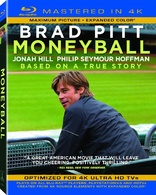Moneyball Blu-ray Movie
HomeMoneyball Blu-ray Movie 
Mastered in 4K / Blu-ray + UV Digital CopySony Pictures | 2011 | 133 min | Rated PG-13 | Jul 16, 2013
Movie rating
7.9 | / 10 |
Blu-ray rating
| Users | 0.0 | |
| Reviewer | 3.5 | |
| Overall | 3.5 |
Overview
Moneyball (2011)
The story of Billy Beane and his controversial yet successful run as general manager of the Oakland A's.
Starring: Brad Pitt, Jonah Hill, Philip Seymour Hoffman, Robin Wright, Chris PrattDirector: Bennett Miller
| Drama | Uncertain |
| Biography | Uncertain |
| Sport | Uncertain |
Specifications
Video
Video codec: MPEG-4 AVC
Video resolution: 1080p
Aspect ratio: 1.85:1
Original aspect ratio: 1.85:1
Audio
English: DTS-HD Master Audio 5.1 (48kHz, 16-bit)
French: DTS-HD Master Audio 5.1
Subtitles
English, English SDH, French, Spanish
Discs
50GB Blu-ray Disc
Single disc (1 BD)
UV digital copy
Packaging
Slipcover in original pressing
Playback
Region free
Review
Rating summary
| Movie | 5.0 | |
| Video | 5.0 | |
| Audio | 4.5 | |
| Extras | 0.0 | |
| Overall | 3.5 |
Moneyball Blu-ray Movie Review
Is 'Moneyball' money in "4K?"
Reviewed by Martin Liebman August 19, 2013Nobody reinvents this game.
Throughout the ages, from reconstruction to Reagan, from Omaha Beach to Obama, baseball has remained a constant, a game of skill played by
people but
easily broken down into a series of numbers and statistics that tell the entire story of a single game, an entire season, an era, or even the sum total
of a player's
career. Numbers like ".284," "3,000," "762," "162," or "90" represent statistics and boundaries like "batting average," "hits," "home runs,"
"games," and "distance from base to base." Baseball has always been about the numbers, and it's the one sport that lends itself so
beautifully to them. One look at a box score or the back of a baseball card can tell so much about three hours of a player's time or three years worth
of a player's life. Only a decade or so ago, those numbers had remained virtually unchanged and unchallenged, and one's perception of them equally
stagnant. Terms like "RBIs," or "runs batted in," were thought to be infallible in determining a player's worth on the field
and, in
turn, how much to pay him and how likely he was to contribute to a winning team. And then something funny happened. Slightly more obscure
statistics --
like "OPB" or "on base percentage" and "SLG" or "slugging percentage" -- began to emerge as additional, and arguably more representative,
numbers correlating to a
player's true worth, which in turn led to even more obscure statistics like "OPS" or "on base percentage plus slugging percentage" and "WAR," or
"Wins Above Replacement." It wasn't a redefinition of statistics
but rather a different way of using them, new ways to judge a player's value to a team. Baseball was turned over and examined through a different
prism, taken apart at the fundamental rubber-core DNA level rather than merely at the red seams as it always had been, the new statistics studying
the raw internal rather than
superficial external elements, the real nitty-gritty results rather than the glamour numbers of yore. Moneyball is the filmed adaptation of
Michael Lewis' book about one baseball general manager's usage of new true value-oriented statistics rather than antiquated baseball numbers and
mindsets to find value in players overlooked by other teams and subsequently constructing a winning team on a small budget.

Reflections on 4K.
It's October, 2001. The Oakland Athletics are battling the New York Yankees in the American League Divisional Series for the right to play for the American League pennant and, ultimately, the World Series. The Yankees roster of high-dollar players -- combining for $114 million in salary -- dispatches the A's and their comparatively tiny $39 million dollar payroll. More money doesn't always translate into success, but this October, it does. Almost worse than the post-season loss is that Oakland is poised to lose three of its top players -- first baseman Jason Giambi, outfielder Johnny Damon, and pitcher Jason Isringhausen -- to free agency, the biggest of the three, Giambi, going to the rival cross-country, big-spending Yankees. The A's simply cannot afford to keep their core star players or acquire new ones via free agency, which all but guarantees them lesser results in 2002, and almost ensures they won't return to the playoffs, unless their young General Manager Billy Beane (Brad Pitt) can pull off a miracle. With limited financial resources, Beane attempts to build a team the old fashioned way, through savvy trades, scouting, and frugal free agent signings. When he travels to Cleveland in an effort to trade for reliever Ricardo Rincon and outfielder Karim Garcia, he is rejected, but he does meet a young wet-behind-the-years Yale economics graduate named Peter Brand (Jonah Hill) who buys into a little-known anti-establishment line of thinking that values players who don't necessarily put up pretty statistics, but who get on base at an extremely high rate, and in baseball, the only way to score runs is to get on base, and scoring runs wins baseball games. Beane hires Brand away from Cleveland and quickly promotes him to the position of Assistant General Manager. Slowly, and against the wishes of the team's established scouts and advisors, Beane and Brand assemble a team of low-cost cast-offs who get on base, no matter their other, more "traditional" numbers. Can such an unorthodox team actually succeed, or will Beane's and Brand's experiment fail? Meanwhile, A's field manager Art Howe (Philip Seymour Hoffman) outright rejects Beane's theories and refuses to play the GM's "moneyball" ballplayers, threatening the experiment before it ever has a chance at either success or failure.
Moneyball exudes a vibe along the same lines of The Social Network as a movie that's a great success based on a (mostly) true story that at-a-glance wouldn't seem like one primed to make for captivating dramatic material. The plot boils down to two people analyzing numbers in a way that hadn't been done before and using that new knowledge to assemble something of value where others might see no potential. Director Bennett Miller (Capote) has not only pulled it off, but crafted one of the finest movies of 2011, a movie that's high on drama, made of well-developed and likable characters, and that finds a much deeper meaning than the plot's mere number crunching might otherwise suggest. Miller's direction is steady an unobtrusive, subtly effective in the way it frames the story rather than telling the story. Miller allows his characters to effectively sell the dubious plot, and they do it with great ease and efficiency. Brad Pitt turns in a masterful performance as the Oakland general manager who carries with him not only the burden of shaping something from nothing, but selling others on his strategy while also working through a shaky home life. He's at home in the part whether dealing with awkward moments between himself, his ex-wife, and her husband, or in the movie's best scene as he plays general managers of other teams off one another in a game of phone tag as he attempts to land a prize left-handed reliever, Ricardo Rincon, in a trade. Jonah Hill is equally superb as the Paul DePodesta makeshift character who is hired on as Beane's assistant. Hill gives the character an intoxicating personality; he doesn't grow completely, but his transformation from an analytical mind that's inwardly certain of itself but outwardly reserved to a character who confidently tells his boss which is the right move and which is the wrong move -- while learning how to deal with the baseball talent, too -- is perhaps the film's most fascinating outside of its core story. Hill is the movie's soul to Pitt's heart; they compliment one another wonderfully and make for one of the finer movie tandems in recent memory. The actors are brilliant in the parts, but the movie's real success comes in the form of its themes.
One question that may leave some people wondering if the movie is "for them" or not is whether it's purely a baseball fan's movie, or if it transcends the sport and delivers something others may enjoy, too. Differently stated, do viewers need to know the names Billy Beane, Scott Hatteberg, David Justice, and Chad Bradford before going in? Do audiences need at least a baseline knowledge of how the game of baseball is played on the field and how the business behind it works off the field? The answer to both is "no," though certainly dedicated baseball fans will better recognize and appreciate some of the lesser characters and more nuanced elements the film has to offer. But a complete lack of baseball knowledge doesn't mask the film's overlying themes, themes that aren't necessarily placed front-and-center but that Moneyball certainly offers outside of its superficialities. Moneyball is a movie that will inspire in any era and transcend any background. At its core, behind the A's green and yellow colors, outside of the management meetings, and away from the diamond lies a story about innovation, bucking a system, finding the true value of something, and looking beyond the superficial in search of something deeper and more meaningful that others ignore based on old prejudices and outdated thinking. Does a player having an "ugly" girlfriend really mean he lacks confidence on the baseball field? Do diminishing numbers mean a player has worn out his worth? Does a bum elbow mean the end of a career? Does an unorthodox arm angle mean a pitcher cannot succeed at the major League level? Does a shoestring budget mean a team is destined to mediocrity or, worse, poor performance? Moneyball is a movie about hope, about finding a way to succeed when the system says there's nowhere to go but down. It's a movie that defines the old saying, "one man's trash is another man's treasure." But Moneyball isn't about getting lucky in the annual small market, no-thought, dumpster dive approach to the free agent marketplace. It's about redefining a system, resetting a mindset, and blazing a unique path to success. The film's subject matter focuses on the mixing of science and outside-the-box thinking to produce incredible results. In essence, it's about redefining more than a century's worth of thinking and doing the impossible: improving upon the perfect game.
Moneyball Blu-ray Movie, Video Quality 
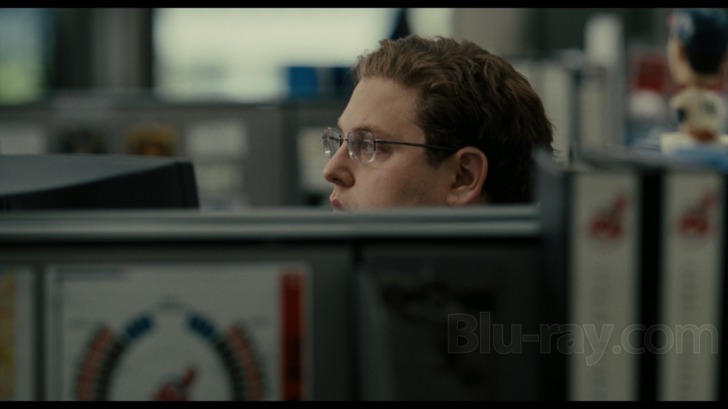
Sony's commitment to releasing the finest Blu-ray products is evident with every spin of a Sony-branded disc. The consistency of product -- from the
latest blockbusters to the most cherished classic titles from years gone by -- is arguably tops in the entire industry, and why shouldn't it be; Sony
was a lead Blu-ray design and advocacy outfit, its PlayStation 3 console offered disc playback and instant wide format adoption, and the first wave of
titles released back in 2006 bore the
Sony label on the spine. Since then, and through a few growing pains and spurts -- a bloody format war, a misstep or two, the transition from Dolby TrueHD to DTS-HD Master Audio -- the
studio has emerged as the most trustworthy in the industry when it comes to its Blu-ray product. When it says Sony, chances are extremely
high that the movie is going to look
(and sound) about as good as the format allows. Now, Sony is recalling the days of its "Superbit" DVD releases with the emergence of "Mastered in
4K"
(*)
Blu-ray discs. The
new
transfers are sourced from 4K masters but here's where the giant asterisk comes in: they're then downscaled to standard Blu-ray 1080p resolution.
That
means buyers can enjoy them on their regular old Blu-ray players and their regular old HDTVs -- no fancy new hardware required. The downside is
that
viewers aren't really seeing the material in 4K; even those who shell out the large sum of cash for a new 4K TV will be treated only to an upscaled
presentation, much the same way today's regular old TV/playback 1080p device combos upscale standard definition DVDs.
Watching the "Mastered in 4K" transfer in 1080p does yield some benefits over the standard 1080p Blu-ray releases, even if it's not a true 4K
experience. The discs
take advantage of a significantly higher bitrate than regular old Blu-ray discs, meaning more muscle to produce the finest picture quality, revealing
superior details and showcasing that perfect cinematic, pleasing grain texturing for pictures photographed on film and more accuracy for those
photographed in the wholly digital realm. "Mastered in 4K" discs also promise superior color balance and accuracy, reproducing a more
faithful-to-the-source palette that will reveal the sort of natural shading and subtle nuance even the best of 1080p Blu-ray cannot match. More, Sony
promises
enhanced viewing on its own line of 4K TVs thanks to a proprietary upscaling algorithm that's designed to squeeze the most out of
the "Mastered in 4K" line of Sony discs, above and beyond what any competitor's display can offer. Makes sense considering some branch of Sony is at
work
along every step of the process. Unfortunately, one of Sony's shiny new 4K televisions was not available for review purposes, but suffice it to say that
either of the launch displays -- the 55" and 65" XBR-labeled sets -- will undoubtedly offer the best consumer viewing picture to date, whether joined
with a Sony "Mastered in 4K" disc or a regular old Blu-ray from any studio.
Moneyball's initial Blu-ray release -- which came out at the beginning of 2012 -- delivered a stellar 1080p
presentation. The "Mastered in 4K" version is every bit as good, maybe even a hint better. They're so close it's difficult to point out any major
differences, particularly viewing in motion, not comparing static screenshots.
The "Mastered in 4K" image appears a bit more elegant, with a slightly more polished appearance, a more refined grain structure, and perhaps slightly
superior details and colors. The image plays gracefully, revealing natural textures and colors in every scene. The entire visual experience proves
delightful as the image reveals rich, well-defined elements in every location, from the field of play to the clubhouse, from the A's meeting room to
Beane's ex-wife's living room. The image springs to life with amazing facial details that reveal the most insignificant flaw, line, or hair in close-ups and
medium distance shots both. Clothing lines, whether casual wear or the Oakland baseball uniforms, look about as good as they would in real life.
Image clarity never wavers, and natural sharpness never gives way to soft edges or fuzzy backgrounds. The Oakland green and yellow colors look
incredible, as do the brief flashes of Met blue and orange and the red practice wear Beane sports in a workout for scouts. There's no evidence of
unwanted tinkering or wear. This another gorgeous "Mastered in 4K" image from Sony.
Moneyball Blu-ray Movie, Audio Quality 
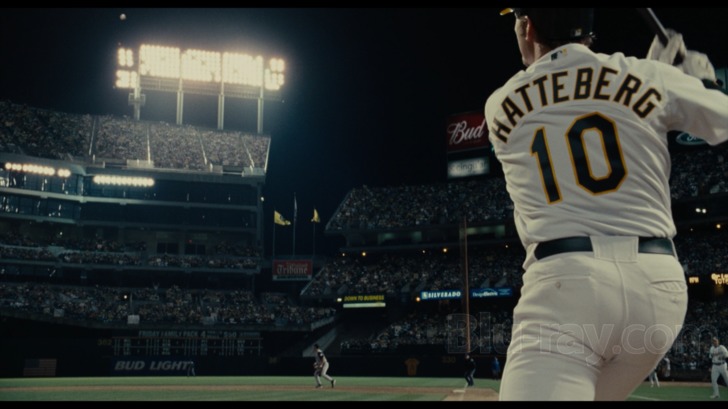
Moneyball's DTS-HD MA 5.1 lossless soundtrack is subtle but very effective. This track plays naturally and with confidence, even if it has little to work with in most instances. Dialogue is smooth and accurate, remaining firmly grounded in the center speaker. Light ambience is very nicely implemented. Shuffling papers and other slight office sounds nicely envelop the listener into the film's various environments, and heavier effects, like the rumbling of a jet engine as heard inside the cabin, are realistically delivered. Baseball games feature superb crowd ambience that spreads out easily across the entire stage. Broadcast commentary is placed at various spots throughout the stage, with seamless delivery and natural integration. There's a very natural feel to even the most challenging of effects, like the crack of a ball off a bat, even in the tight confines of the clubhouse batting cages. Moneyball is by no means a system-stretching track, but Sony's presentation is natural and highly accurate nonetheless.
Moneyball Blu-ray Movie, Special Features and Extras 
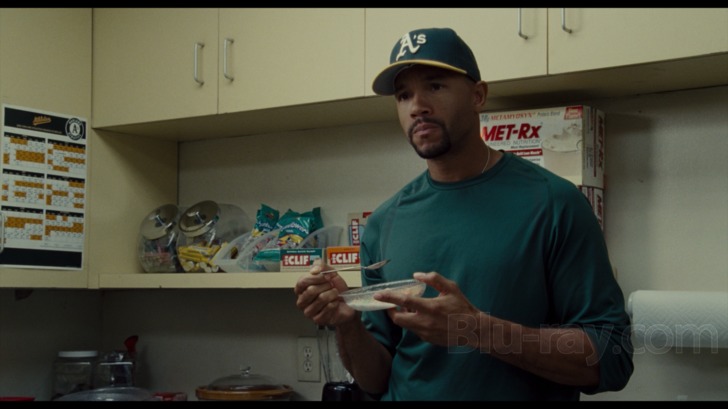
This Blu-ray 4K release of Moneyball contains no bonus content. However, a UV digital copy voucher is included in the case.
Moneyball Blu-ray Movie, Overall Score and Recommendation 
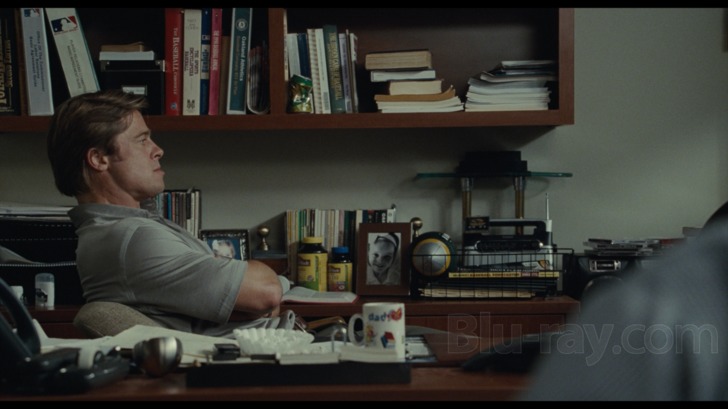
Moneyball represents exceptional filmmaking. It tells a story of hope, of characters who choose to search outside the box in a world that sees the box as gospel, as the end-all, be-all source of knowledge and truth that might not always be right, but the represents the only way to progress towards success. It's a movie that shows that money can buy a lot of things, but it can't always buy smarts and loyalty, both encapsulated in Billy Beane's character arc. This is a very strong movie with a great cast, wonderful performances, quick and snappy dialogue, and an air of authenticity both in its story and its broader themes of accomplishment by any means necessary, including those never before tried and dismissed by the establishment without consideration. Moneyball is one of 2011's best, and Sony's "Mastered in 4K Blu-ray release does the film justice. Excellent 1080p picture quality sourced from a 4K master and fantastic audio make for a great package. However, considering the absence of extras and the very minimal change in quality, this release does not come recommended to anyone without access to a television that can do the disc justice.
Other editions
Moneyball: Other Editions

Moneyball 4K
2011

Moneyball
2011

Moneyball
with Exclusive Slipcover and Bonus Disc
2011

Moneyball
Combo Pack
2011

Moneyball
2011
Similar titles
Similar titles you might also like

42
Target Exclusive 30 mins of Bonus Content
2013

The Express
2008

The Fighter
2010

Foxcatcher
2014

Cinderella Man 4K
2005

The Damned United
2009

I, Tonya
2017

The 5th Quarter
Special Edition
2010

Rudy
1993

Raging Bull 4K
1980

Ferrari
2023

My All American
2015

Trouble with the Curve
2012

The Basketball Diaries
1995

Draft Day
2014

Any Given Sunday
15th Anniversary Edition | Director's Cut | Includes Theatrical Cut DVD
1999

Bleed for This
2016

Race
2016

Chuck
2017

Million Dollar Arm
2014
